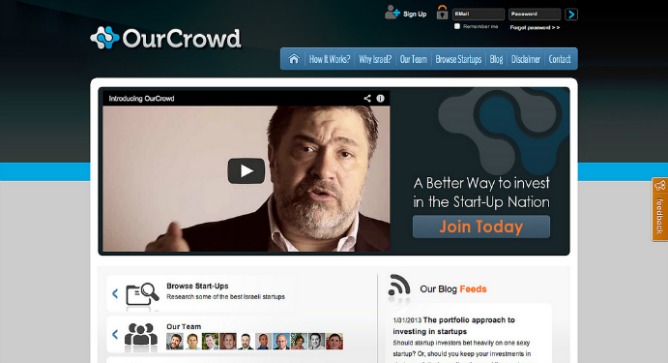Serial entrepreneur and venture capitalist Jon Medved says he can’t believe it took him so long to conceptualize an equity crowd-funding platform for accredited investors wishing to endow Israeli startups.
But once he thought of OurCrowd and launched it with a team of 10 investment professionals in October 2012, it did not take long for the concept to catch on. By early February, Jerusalem-based OurCrowd had won $5.5 million in funding for its platform and $6.5 million for 12 portfolio startups, with an average deal size of half a million dollars.
Spread the Word
• Email this article to friends or colleagues
• Share this article on Facebook or Twitter
• Write about and link to this article on your blog
• Local relevancy? Send this article to your local press
“It’s more than a little bit of an anomaly that startups have been agents of change and disruption for 20 years, yet the process of funding has not changed at all,” Medved tells ISRAEL21c.
“The Web is a great agent of change, providing a way to link customers with products. If you look at investments as products and investors as customers, what better way to link them together than the Web — especially when the investors live all over world and want to hook up to the ‘Startup Nation.’ I’m sort of surprised it’s taken me this long to think of using the Web to streamline and automate the startup investment process.”
Not Kickstarter
OurCrowd differs from existing successful “self-service” crowd-funding sites, such as Kickstarter, in several fundamental ways.
“Putting a project up and saying ‘fund me’ might work for a smaller deal like producing a record, but with real investments it’s not going to work,” says Medved, a former member of ISRAEL21c’s board of directors.
“We had to create a safe space for investors to feel comfortable investing over the web. We do that with a rigorous selection process of the opportunities we bring them, and we put our own money into every company we put on the site.”
Another major difference: Not just anyone can access the opportunities. “We put it to a select group of people who are classified in the regulatory sense as accredited investors only. Each country has different criteria for that — in United States, you have to have $1 million in assets. Without that, you can’t get into our site. And we don’t take $50 as a minimum investment; it starts at $10,000.”
Finally, adds Medved, with OurCrowd the investment process is only the beginning of the story.
“If you think you’ve done your job just hooking up an early-stage company with an investor that is a disservice to both sides because the companies need support and active board participation, access to contacts and business development opportunities, and the investor needs someone to report to him and manage the investment.
“So in another differentiation, we are taking board seats and opening doors like crazy with our network of contacts, harnessing the power of the crowd on our companies’ behalf.”
Crowd funding specific to Israel
The first deals completed on the site so far involve organic e-commerce site AbesMarket.com; Sherpa, a new Internet information venture from the founder of Answers.com; freight-forwarding automation venture TradeOS; Parko, the social parking solution that recently won Google’s Israel Mobile Challenge Competition; and Consumer Physics, which is building a pocket spectrometer for smartphones.
Medved says Israeli startups are in strong demand.
“OurCrowd answers the issue of how to help people I meet abroad when I speak on behalf of Israel. They say, ‘The technology scene in Israel is wonderful. How do I play?’ In the past, I’d direct them to buy stock if it was a public company, or invest through venture capital, but if they wanted to get into a startup of their own choosing, I’d just take their cards.
“Thousands of cards later, I was watching what was going on in crowd funding over the Web, and in my opinion no one had done it in the right way and not specifically for Israel,” he says.
Medved’s team includes Steven Blumgart, formerly of Glencore; Pini Lozowick, formerly of Broadcom and Alta Berkeley; Elan Zivotofsky, formerly of Goldman Sachs and Lehman Brothers; Zack Miller, formerly of SeekingAlpha; Gadi Mazor, formerly of Onset, Robbie Citron of Jerusalem Global; Jay Kalish of Allot; and David Arnovitz formerly of SecureWare.















